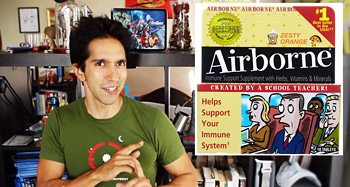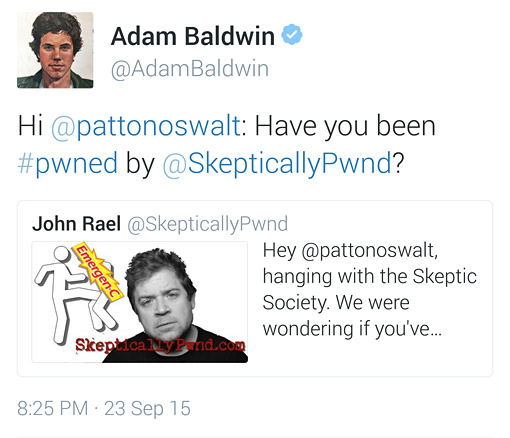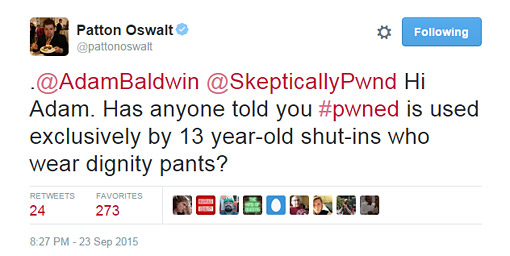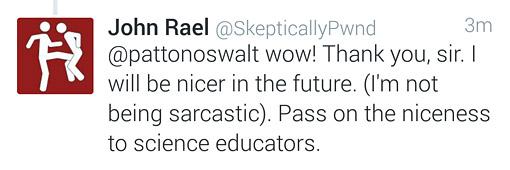
View the video version of this discussion on YouTube.
I had a skeptic “win.” That is, I produced content partially inspired by someone’s misconception; this same someone saw my content, and then changed their mind. Essentially, “Hey, you’re wrong, and here’s why.” “Huh. I guess I am wrong. Copy that.”
That never happens! I mean, yeah, it happens, but rarely enough that skeptics (if you’ll forgive the turn of phrase) tend to forget the hits and remember the misses. Cynicism is easy, but rarely correlates with reality. To give you a full picture, we have to go back to 2006 and look at Michael Shermer’s Scientific American article about Airborne entitled “Airborne Baloney.” In this article he explains how Airborne—”an orange-flavored effervescent concoction of herbs, antioxidants, electrolytes and amino acids that fizzles into action in a glass of water”—offers no objectively measurable effect on people’s health. Basically, it’s bullshit being sold to you in the style of a confidence man: “Hey, I’m just a school teacher. I’m an ordinary person like you. Now give me your money!” This, of course, was bad news: a company was misleading customers. However, some people considered it news that was bad to share.
In 2013 comic and actor Patton Oswalt was a guest on Never Not Funny, a podcast hosted by Jimmy Pardo and Matt Belknap. On the episode, they express great amounts of vitriol—not towards the multimillion dollar company who was, and still is, making money off of the ignorance of consumers, but against the science educator (“one of these fucking ‘skeptic’ assholes”) who was pointing out the truth.
Now, normally, OK—it’s a comedy podcast, you gotta fill the time with bits and rants. So who cares? Right? And if this was Danny Lobell and Joe Rogan, I wouldn’t even blink as they concocted their conspiracy theory about the “skeptic virus that’s killing our placebo effect, bro!”
But hearing Patton Oswalt publicly “name and shame” a science educator for providing scientific education was really disheartening. I have a great deal of respect for Patton Oswalt; not just because of his comedy, but his ability to think critically, to assess situations and take informed stances. This is a guy who, much more often than not, is on the side of reason and science education. This is a guy who hangs out with Neil deGrasse Tyson.
So after a friend posted a link to the podcast in question, and when a couple months later I received money from a legal settlement against the similar product “Emergen-C,” I decided to make a video (embedded below) about sham products—and about Patton’s conspiratorial misunderstanding of the placebo effect:
Fast forward to last Wednesday night. I’m out shooting (archery) with the Skeptic Society, as we do most weeks; we’re having dinner afterwards, and we start talking about Harriet Hall, the “SkepDoc,” and sham medicine in general, and I say, “Hey, did you guys hear that time that Patton Oswalt zinged Michael for his article about Airborne?” So I pull up my video, and I send it to a couple people at the table, and I figure, “Well, since I’m here, might as well tweet it. I’ll even tweet it at Patton himself; like he’s even gonna notice!” Within minutes I’m getting numerous and random notifications. As it turns out, my tweet had been immediately snatched up and used by actor Adam Baldwin (the Firefly guy):
I don’t really know the full story about him and Mr. Oswalt, but apparently he has some alerts set up, or just happened to be doing some vigorous searching for anything negative about Patton at that exact moment. I don’t know, and despite it being a very public thing between them, it’s none of my business. I would also prefer not to know; as much as I like hearing the thoughts and musings of Patton Oswalt; since a large portion of his art is expressing such things (ie, stand up comedy), I have no interest whatsoever in hearing the ideology of Adam Baldwin or pretty much anyone whose art doesn’t include a non-fictional self representation. If Angelina Jolie or Steven Spielberg aren’t talking about their craft, I don’t care, but I’d love to hear all the opinions of Doug Stanhope and Laurie Kilmarten.
But I’ll admit, knowing absolutely nothing about Adam Baldwin outside of Firefly, I was pretty chuffed to have him pimp one of my videos…. And then Patton responded:
Then all of their respective fans started responding, and it got a little ugly. I even chimed in a couple smart alec tweets myself. But my heart started sinking a little. I’m a fan of Patton Oswalt’s, and there I was thinking, “Now just because of the context of who’s supporting my position on Twitter, he’s going to dig in his heels and dismiss me and my content. That sucks….”
But then Mr. Oswalt responded again, honestly and graciously:
I think it’s a beautiful moment of irony when the effort to discredit someone, and potentially polarize people, is what what actually causes someone to earn respect, and mend fences that they didn’t even know were broken.
I’ll be the first to admit that I really oversimplified the placebo effect; and, frankly, short of producing an hour long video on the subject, I kind of have to. It’s complicated…very complicated. I didn’t want leave anyone with the wrong impression: There is definitely a placebo effect, I’m not making the claim that the placebo effect is a myth. It does exist, and it has a measurable effect. This doesn’t mean that the effect can do anything that can be objectively measured, but can be subjectively reported by the patients themselves. Of course, some of the subjective effects can indirectly lead to objectively measurable effects. For example, if you decrease your perception of pain your blood pressure may go down, you might breathe easier, etc. Just keep in mind that the vast majority of research shows a huge difference (though sometimes with blurry lines) between “this treatment works” and “this treatment works as a placebo,” but sometimes working as a placebo, ie. changing the patient’s perception is the goal of actual treatments and actual medicine—however it’s complicated! Really complicated! Here is a fairly substantial overview of the concept by Harriet Hall.
So as I say, placebos are complicated, and it would be all too easy to be intellectually dishonest and say, “Well, from a particular perspective in the light of specifically selected studies Patton’s position was kind of sort of beginning to approach what might resemble something that could be called a portion of the truth on the second tuesday of even months.” Which is what some of Patton’s fans are doing. But that’s not what Patton is doing.
He’s not doubling down; he’s not pretending that “Oh well, that was a very hyperbolic version of a very reasonable stance.” No, he’s owning up to it like a boss, and keeping my cynicism at bay for at least another 6 months. This was a major skeptical coup for me, and all it took was “Oh yeah, I guess I was wrong…next time mind your manners.” And in response to the request to “be nicer”…
OK. Sure!
Usually my videos and criticisms take place as satire or parody, and when I’m doing a narrative form of mockery, I have no reservations about being rude or insulting. When I’m just myself, I can often be rude and insulting, but I have some reservations about it—and sometimes it can be a healthy reminder for me to be asked to be a little bit nicer.
I know this may not be a huge deal in the grand scheme of things, but this is a bona-fide skeptic win. As much as I love it when people get punished for peddling false claims, I’d prefer that people change their minds about false claims. Coincidentally, not many people understand this better than Michael Shermer himself who has changed his own mind about certain topics in recent years.
Well, I hope you enjoyed this excessive update. Thanks for stopping by; and Patton, I look forward to seeing you on stage.















I’m also a fan of Patton Oswalt for the same reasons and was surprised to hear Patton say such things but I am not surprised at his introspection and then his admission that his initial response was incorrect. He appears to be a thoughtful sort of person, in character and probably not in character. Regardless, I enjoyed your post.
So I was investigating why the 2015 Cochrane Review of “Zinc for the common cold” was withdrawn “due to concerns raised via the feedback mechanism regarding the calculation and analysis of data in the review in April 2015.”
Were the concerns raised by skeptics or proponents of Zinc? Apparently, they were raised by Harri Hemilä, MD, Ph.D., from the University of Helsinki Department of Public Health, who co-authored the Cochrane review of “Vitamin C for preventing and treating the common cold.” That review concluded that vitamin C may prevent colds in people exposed to brief periods of severe physical exercise, and reduce the duration and severity of colds somewhat.
His webpage on the “Ten most important findings” includes:
Vitamin C supplementation decreases the risk of the common cold by 50% in people under heavy acute physical stress (1996)
Vitamin C (>1 g/d) shortens the duration of the common cold in adults by 8% and in children by 18% (2013)
Zinc lozenges may shorten the duration of the common cold by up to 40% (2011)
Vitamin E may increase life expectancy by 2 years in some groups of males (2011)
Also see his paper, “Vitamin C, the placebo effect, and the common cold: a case study of how preconceptions influence the analysis of results. ”
ABSTRACT. A large number of placebo-controlled studies have shown that vitamin C supplementation alleviates the symptoms of the common cold, but widespread skepticism that vitamin C could have any significant effect remains. One of the most influential common cold studies, published in 1975, was carried out by Thomas Karlowski et al. at the National Institutes of Health. Their placebo consisted of lactose, which can easily be distinguished from ascorbic acid by taste. Karlowski et al. found a 17% decrease in the duration of cold episodes in the group administered vitamin C (6 g/day); however, they suggested that the decrease was entirely due to the placebo effect. In this article it will be shown that the placebo effect is not a valid explanation for the results of the Karlowski study, as it is inconsistent with their results.
This is an important conclusion for two reasons. First, the placebo explanation becomes even more unreasonable as regards the reported benefits found in several other studies with valid placebo tablets. Second, as the results from the Karlowski study are not due to the placebo effect, their results can be used to assess the quantitative effects of vitamin C supplementation.
The most important conclusions from Karlowski’s study are that therapeutic vitamin C supplementation during a common cold episode appears to be as effective as regular supplementation, and that there appears to be linear dose dependency at least up to 6 g/day. These findings suggest that large therapeutic vitamin C doses might alleviate the symptoms of the common cold substantially.
I kick ass at archery.
Why don’t you swing on by Pasadena sometime, and prove it!
This is nice: “As much as I love it when people get punished for peddling false claims, I’d prefer that people change their minds about false claims.” Well said.
Don’t be too impressed by moral- and logic-challenged Baldwin…
http://m.huffpost.com/us/entry/4846727
In this “win”, Oswalt deserves equal, if not more credit for his humility. Wins are rare not because good arguments are rare, but because publically admitting you’re wrong is *hard*.
I’m no Oswalt fan (never even heard of him before) but imo the true skeptic win belongs to him.
:)
Congrats on the win!
Am I the only one feeling a bit of irony with Mr. Oswalt asking you to “be nicer” after listening to his profanity-laced, vitriolic tirade? Pot-kettle-black, I think. Yeah. Wee bit hypocritical.
I’m still waiting for him to pull his head out of his ass on vaccines. Anti-vaxxers get ZERO respect or consideration from me. Maybe you can take him to task over that.
Patton is strongly pro-vax and has ferociously mocked anti-vaxxers many times. Not sure why you think otherwise unless you are mixing him up with Bill Maher?
Well, that’s it: I’m a Raelian
Congrats on the skeptic win! Also a loving the the skeptics shoot archery.